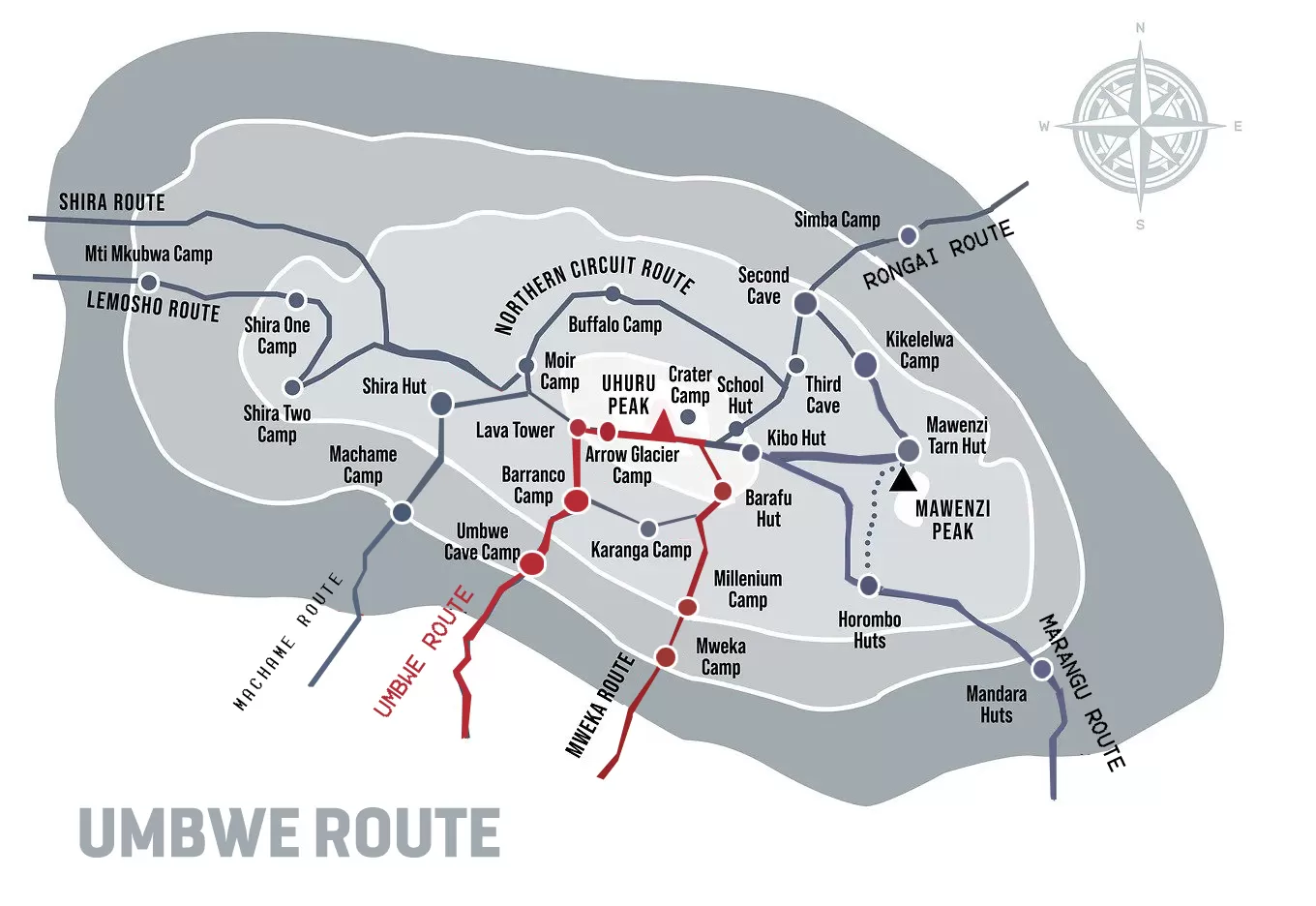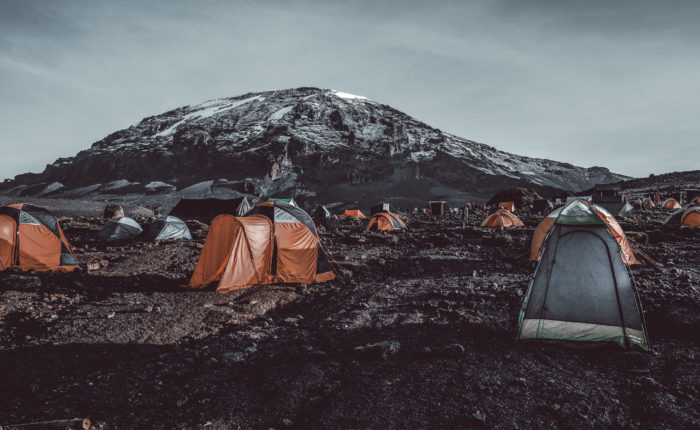TRIP – ITINERARY
Day 1 : Trekking from Moshi to Umbwe Gate and to Umbwe Cave Camp
After a hearty breakfast, a short drive will take you from Moshi to the Umbwe Gate, where you’ll complete park registration and officially begin your trek. The trail winds through lush rainforest, offering glimpses of exotic flora and fauna along the way. As you ascend, you’ll gradually gain elevation, eventually reaching Umbwe Cave Camp, your home for the night. Dinner will be served amidst the tranquility of the forest, setting the stage for the days ahead.
- Elevation: 1,000m/3,280ft to 2,850m/9,350ft
- Hiking Time: 5-7 hours
- Distance: 11km/7 miles
- Difficulty: Moderate to Difficult
- Habitat: Rainforest
Day 2 : Trekking from Umbwe Cave Camp to Barranco Camp
Leaving Umbwe Cave Camp behind, you’ll continue your journey through diverse terrain, including the challenging Barranco Wall. As you climb, the scenery changes from lush forest to open moorland, offering stunning views of Kilimanjaro’s towering peaks. By midday, you’ll arrive at Barranco Camp, nestled in a scenic valley. Here, you’ll rest and recharge for the adventures to come.
- Elevation: 2,850m/9,350ft to 3,960m/13,000ft
- Hiking Time: 4-6 hours
- Distance: 6km/3.7 miles
- Difficulty: Difficult
- Habitat: Moorland
Day 3 : Trekking from Barranco Camp to Karanga Camp
Today’s trek takes you from Barranco Camp to Karanga Camp, traversing the rugged landscapes of Kilimanjaro’s alpine desert. Along the way, you’ll navigate steep ridges and valleys, with breathtaking vistas unfolding at every turn. By late afternoon, you’ll arrive at Karanga Camp, where you’ll spend the night beneath the star-studded African sky.
- Elevation: 3,960m/13,000ft to 4,035m/13,106ft
- Hiking Time: 4-5 hours
- Distance: 5km/3.1 miles
- Difficulty: Moderate
- Habitat: Alpine Desert
Day 4 : Trekking from Karanga Camp to Barafu Camp
As you ascend to Barafu Camp, the air grows thinner, and the landscape transforms into a barren, lunar-like expanse. Despite the challenging terrain, the camaraderie among your fellow trekkers and the promise of reaching new heights keeps you motivated. Upon reaching Barafu Camp, you’ll enjoy a hearty meal before resting in preparation for the final push to the summit.
- Elevation: 4,035m/13,106ft to 4,640m/15,223ft
- Hiking Time: 4-5 hours
- Distance: 4km/2.5 miles
- Difficulty: Moderate to Difficult
- Habitat: Alpine Desert
Day 5 : Trekking from Barafu Camp to Uhuru Peak and Descending to Mweka Camp
Today is the culmination of your journey as you embark on the exhilarating trek to Uhuru Peak, the highest point in Africa. Beginning in the darkness of night, you’ll navigate steep switchbacks and icy terrain under the guidance of your experienced guides. As the sun rises over the horizon, you’ll reach Stella Point before continuing to the summit. Upon reaching Uhuru Peak, you’ll be rewarded with awe-inspiring panoramic views and a profound sense of accomplishment. After celebrating your achievement, you’ll begin the descent to Mweka Camp, where a warm meal and well-deserved rest await.
- Elevation: 4,640m/15,223ft to 5,895m/19,341ft, then down to 3,100m/10,170ft
- Hiking Time: 10-14 hours
- Distance: 17km/10.5 miles
- Difficulty: Very Difficult
- Habitat: Arctic to Rainforest
Day 6 : Descent from Mweka Camp to Mweka Gate and Return to Moshi
Your final day on the mountain begins with a leisurely descent through the lush rainforest, retracing your steps back to Mweka Gate. Along the way, you’ll savor the sights and sounds of the forest, reflecting on the incredible journey you’ve undertaken. Upon reaching Mweka Gate, you’ll bid farewell to your guides and porters before transferring back to Moshi. Here, you’ll enjoy a hot shower, a delicious meal, and a well-deserved night of rest in the comfort of your hotel.
- Elevation: 3,100m/10,170ft to 1,650m/5,413ft
- Hiking Time: 3-4 hours
- Distance: 10km/6.2 miles
- Difficulty: Moderate
- Habitat: Rainforest
TOUR ROUTE MAP

PRICE CHARGED FOR THIS TOUR
- $ 2800 per single person
- $ 2300 per group sharing
- $ 1800 per 3+ group sharing.
PRICE INCLUSION.
- Airport transfer on arrival and departure day
- 2 nights comfort stay in lodge the day before and after climbing.
- Transport to and from Mountain
- All park entrance fee +18% VAT
- All park accommodation fee + 18% VAT
- Park rescue fee
- Food on the mountain (3-meals a day)
- Non personal hiking equipment and gears
- Salary to guide, cook, and the crew.
PRICE EXCLUSION:
- Tipping
- Personal hiking gear and rentals
- Other personal expenses out of the mentioned above.
ESSENTIAL MOUNTAIN CLIMBING GEARS
50L waterproof duffle, small-size backpack, warm clothes including trouser, sweater, thermal underwear, and enough pair of warm socks, Balaclava, snow goggles, or ski sun glasses and scarf, waterproof layers, sun roof hat, warm sleeping bag, mattress, warm jacket, and a pair of gloves. Comfort mountain boots, and walking poles, Sun cream, first aid kit, a knapsack, a pair of getters and water-bottle, minimum 2litres each.
Mount Kilimanjaro climb: Tips for safe and successful Kilimanjaro summit.
- Choose the best route that offers good acclimatization, oxygen decreases as you climb to higher elevation, choose the routes that offer the acclimatization throughout to avoid the possibility of experiencing higher altitude mountain sickness. In this case Rongai, Lemosho, and Machame routes are highly recommended.
- Be well prepared and full equipped for Kilimanjaro trekking, do not forget to carry all necessary trekking equipments and gears. Remember, weather in the mountain is not precisely predictable; having with you the all weather gears is the best decision.
- Do not carry too much heavy day-pack. Most of your item luggage will be carried by Kilimanjaro porters; you will just carry your light day pack bag, which contains the most necessary personal use for a day only.
- Listen carefully to your guide, do not ignore the little advice from your guide, our Kilimanjaro guides are having more than 10-years experience, they have a broad working knowledge of Mount Kilimanjaro, please listen to what they direct you to do.
- Eat enough food and drink more water so that your body won’t run out of energy, long day working requires body energy, make sure you eat as much as you can. Do not forget to go to bed early so that you will wake up with new energy to continue climbing.
- Choose the best time to climb Mount Kilimanjaro. Your chance to summit Kilimanjaro peak is highly influenced by the external factors like bad weather, knowing the best time to go for Kilimanjaro trekking will help you plan your adventure accordingly.
Best time of the year to go for Mount Kilimanjaro Climbing:
- June to October-peak of high season, most of the Kilimanjaro routes and hotels are crowded.
- October to December-Most of the Kilimanjaro routes are less crowded, this season may be associated with seasonal rainfall so not that much good for climbing.
December to end of February-High season most of the routes and hotels are crowded.
- March to early of June-Low season, it’s the peak of the wet season as these months are associated with heavy rainfalls so not ideal for climbing.


